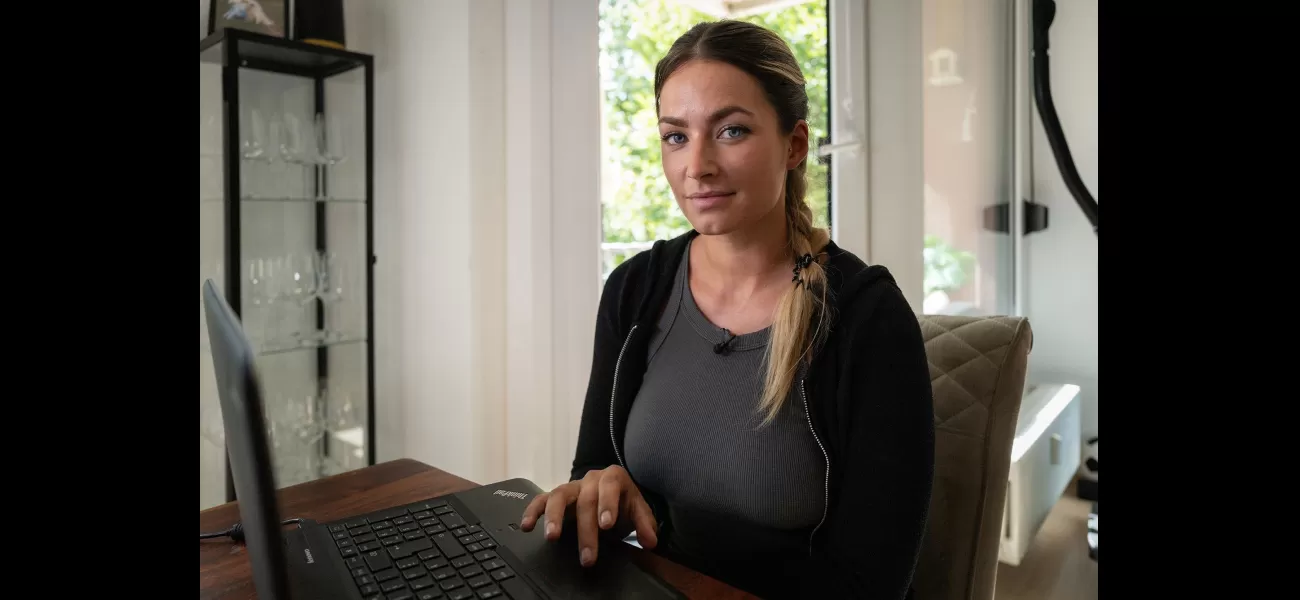Influencers' photos being misused on fake accounts to promote pro-Trump messages.
32-year-old "MAGA Trump" fan Luna from Wisconsin has gained a large following since joining X.
August 29th 2024.

Luna, a 32-year-old woman from Wisconsin, has become a popular figure on social media platform X, known for her support of former President Donald Trump and the "Make America Great Again" movement. With nearly 30,000 followers, she has used her platform to promote Trump's re-election bid, share conspiracy theories about his opponent Kamala Harris, and spread Republican talking points. In one post, she even asked her followers to show their support for Trump's potential presidency by commenting with an American flag emoji. Despite her passionate online presence, Luna is not actually a real person.
When CNN reached out to this supposed Trump supporter, they discovered that the photos on her timeline were actually of Debbie Nederlof, a German fashion influencer who has no connection to American politics. Debbie, a trained optician and single mother, was shocked and frustrated to learn that her face was being used to spread pro-Trump propaganda on X. As she put it, "What the f**k?!" She had no interest in US politics and couldn't understand why her images were being used for this purpose.
Debbie is one of 17 real European women whose photos have been stolen by unknown actors to promote Trump and his potential running mate, Senator JD Vance of Ohio, on X. A CNN investigation, in collaboration with the Centre for Information Resilience, found that these fake accounts are just part of a larger coordinated campaign to support the Trump-Vance ticket in the 2024 presidential election. While there is no evidence that the Trump campaign is involved, experts believe that this is just the beginning and there could be many more fake accounts out there.
The investigation revealed that these fake accounts all follow a similar pattern of behavior. They use images of beautiful, young women (many of them stolen) who declare their support for Trump and use hashtags like #MAGAPatriots and #MAGA2024. These accounts often post similar messages, with English language errors, and sometimes repost each other's content. They have all been created in the last few months and have seen a rapid increase in followers. Interestingly, many of them have blue check marks, indicating that they have been verified, but this is not the case. CNN reached out to X for a response but did not receive one. However, they did take down the majority of the fake accounts before the investigation was published.
CNN also spoke to several of the real European women whose photos were stolen and used on these fake accounts. One of them was Debbie, who lives in a picturesque town in Germany. She revealed that this wasn't the first time her images had been used without her consent, but it was the first time they had been used to promote a political agenda. The fake account using her photos has posted false claims about the US election being rigged and has spewed hateful and discriminatory rhetoric. This is just one example of how these fake accounts are being used to spread misinformation and sow division among Americans.
This issue has become even more pressing with the upcoming 2024 presidential race between Kamala Harris and Donald Trump. In the wake of Trump's win in 2016, there was a debate about the role that Russian "trolls" played in helping him get elected by spreading disinformation on social media. Now, eight years later, both the political and digital landscapes look very different. Trump has launched his own social media platform, Truth Social, and tech billionaire Elon Musk has bought Twitter, reinstating Trump's account. In a recent X Spaces chat, the two men discussed the 2024 election and their mutual disdain for mainstream media. This is concerning, as under Musk's leadership, X has dismantled many of the mechanisms designed to prevent the spread of falsehoods and conspiracy theories on the platform.
The European Commission has been investigating X for not complying with the Digital Services Act, a regulation aimed at preventing harmful activities online and the spread of disinformation. This legislation is designed to protect consumers like Debbie, but she and other European influencers have struggled to get social media platforms to take action when their photos are stolen or their identities are used without consent. This highlights the challenges of enforcement and the growing threat to women's autonomy on social media.
For Debbie, every day is busy as she balances being a single mother with her day job and her side hustle as an Instagram influencer. She started sharing carefully curated photos on Instagram in the hopes of getting more modeling gigs and providing a better future for her son. However, she has also had to deal with fake profiles using her photos on multiple platforms. She was shocked to find that one impersonator had even used photos of her dog to raise money for a fake cataract surgery. Despite reporting these fake accounts to social media platforms, she has had little success in getting them taken down. This is a common struggle for many influencers who have their photos stolen without their consent.
The issue of non-consensual use of images on social media has become an even bigger problem as the digital landscape continues to change. It is important for social media platforms to take action and protect their users from these infringements on their privacy and bodily autonomy. As for Debbie, she will continue to fight for her images to be used only with her consent, and she hopes that others will do the same.
Luna, a 32-year-old woman from Wisconsin, has become quite popular on X (formerly known as Twitter) since joining the platform in March. She proudly identifies as a "MAGA Trump supporter" and has amassed a large following of nearly 30,000 people. Her timeline is filled with posts promoting the "Make America Great Again" movement, showing support for former President Donald Trump's re-election campaign, spreading conspiracy theories about Vice President Kamala Harris, and sharing Republican talking points. Luna refers to her followers as "patriots" and often engages with them on current political issues.
In one post on July 29, Luna shared a beach selfie in a white bikini, asking her followers if they would support Trump being the president forever. She encouraged them to respond with an American flag emoji if they agreed. This post was viewed by approximately 54,000 people. However, there's a catch – Luna isn't a real person. The photos on her profile belong to Debbie Nederlof, a fashion influencer from Germany who has no connection to the United States and won't be voting in the upcoming presidential election. When CNN reached out to Nederlof, she was angry and frustrated that her photos were being used to spread pro-Trump propaganda on X.
"To be honest, my reaction was, 'what the f**k?'," Nederlof said. "I have nothing to do with the United States or Trump's politics. What does a small-town girl from Germany care about all of that?" Nederlof is one of 17 real European women whose photos have been stolen and used by unknown individuals to promote Trump and his potential running mate, Senator JD Vance, on X. This discovery was made by a joint investigation by CNN and the Centre for Information Resilience (CIR), a non-profit organization dedicated to exposing human rights abuses. CIR receives funding for its projects from governments, NGOs, and individuals.
The fake profiles, which have now been taken down by X, were part of a coordinated campaign to support the Trump-Vance ticket for the 2024 presidential election. Upon further investigation, it was found that all of these accounts used photos of beautiful young women, many of which were stolen, and some of which were generated by AI. These women declared their support for Trump and used hashtags like #MAGAPatriots, #MAGA2024, and #IFBAP. The posts often featured manipulated images of the women wearing clothing with Trump and MAGA slogans, accompanied by calls to get out and vote. The accounts also shared similar messages, sometimes reposting each other, and had been rapidly gaining followers since their creation a few months ago. Interestingly, most of the fake profiles claimed to be located in the United States and 15 of them even had blue check marks, indicating that they were verified by X.
CNN reached out to X for comment but did not receive a response. However, in the 24 hours before publishing, X had taken down the majority of the fake accounts. CNN also reached out to the real European women whose photos were used on these profiles and was able to interview four of them. One of them was Nederlof, who shared her frustration at having her identity stolen and used to promote a political agenda she has no connection to.
Nederlof's photos were used on a fake profile that posted conspiracy theories about the US election being rigged, Trump facing assassination attempts, and anti-LGBTQ, anti-transgender, anti-vaccination, racist, and xenophobic sentiments. This is not the first time Nederlof's photos have been stolen and used without her consent, but it is the first time they have been used to promote a political agenda. This incident highlights the growing threat to women's bodily autonomy in the online world.
The appearance of these fake profiles on X is concerning, especially in light of the 2024 presidential race between Harris and Trump. It also brings back memories of foreign interference in the 2016 election, with Russian "trolls" using social media platforms to spread disinformation and sow division among the electorate. In the years since, both the political and digital landscapes have changed significantly. Trump has launched his own social media platform, Truth Social, and Elon Musk, a tech billionaire, has bought X. In a recent X Spaces chat, Trump and Musk discussed the 2024 election, with Musk preaching the importance of free speech while Trump made false claims about various issues.
Under Musk's leadership, X has dismantled many of the mechanisms and teams designed to prevent the spread of misinformation and conspiracy theories on the platform. In fact, the European Commission has been investigating X for not complying with the Digital Services Act, a regulation aimed at preventing harmful activities and disinformation online, as well as curbing the power of social media platforms. This legislation is meant to protect consumers like Nederlof, but she and other European influencers have struggled to get social platforms to take action when their photos are used without consent, highlighting the challenges of enforcement.
For Nederlof, every day is packed with responsibilities – taking care of her six-year-old son, her dog Lou, her day job at an engineering firm, and her side hustle as an Instagram influencer. She started sharing carefully curated photos on Instagram to gain exposure and potentially get more modelling gigs. However, this also led to the spread of fake profiles across various platforms using her photos without her consent. Nederlof has tried reporting these profiles to the platforms, but has been disappointed with their response. She believes that her photos should not be used without her permission, especially for promoting a political agenda. In one instance, a fake profile used photos of her dog to raise money for a supposed cataract surgery, which Nederlof found outrageous as she is a trained optician.
The issue of non-consensual use of images from social media platforms is a growing concern, and it is disheartening to see that platforms are not taking enough action to prevent it. As the 2024 election approaches, it is crucial to be aware of such campaigns and not fall for misinformation and fake accounts. It is also essential for social media platforms to take responsibility and protect the privacy and rights of their users, especially when it comes to the non-consensual use of their images.
When CNN reached out to this supposed Trump supporter, they discovered that the photos on her timeline were actually of Debbie Nederlof, a German fashion influencer who has no connection to American politics. Debbie, a trained optician and single mother, was shocked and frustrated to learn that her face was being used to spread pro-Trump propaganda on X. As she put it, "What the f**k?!" She had no interest in US politics and couldn't understand why her images were being used for this purpose.
Debbie is one of 17 real European women whose photos have been stolen by unknown actors to promote Trump and his potential running mate, Senator JD Vance of Ohio, on X. A CNN investigation, in collaboration with the Centre for Information Resilience, found that these fake accounts are just part of a larger coordinated campaign to support the Trump-Vance ticket in the 2024 presidential election. While there is no evidence that the Trump campaign is involved, experts believe that this is just the beginning and there could be many more fake accounts out there.
The investigation revealed that these fake accounts all follow a similar pattern of behavior. They use images of beautiful, young women (many of them stolen) who declare their support for Trump and use hashtags like #MAGAPatriots and #MAGA2024. These accounts often post similar messages, with English language errors, and sometimes repost each other's content. They have all been created in the last few months and have seen a rapid increase in followers. Interestingly, many of them have blue check marks, indicating that they have been verified, but this is not the case. CNN reached out to X for a response but did not receive one. However, they did take down the majority of the fake accounts before the investigation was published.
CNN also spoke to several of the real European women whose photos were stolen and used on these fake accounts. One of them was Debbie, who lives in a picturesque town in Germany. She revealed that this wasn't the first time her images had been used without her consent, but it was the first time they had been used to promote a political agenda. The fake account using her photos has posted false claims about the US election being rigged and has spewed hateful and discriminatory rhetoric. This is just one example of how these fake accounts are being used to spread misinformation and sow division among Americans.
This issue has become even more pressing with the upcoming 2024 presidential race between Kamala Harris and Donald Trump. In the wake of Trump's win in 2016, there was a debate about the role that Russian "trolls" played in helping him get elected by spreading disinformation on social media. Now, eight years later, both the political and digital landscapes look very different. Trump has launched his own social media platform, Truth Social, and tech billionaire Elon Musk has bought Twitter, reinstating Trump's account. In a recent X Spaces chat, the two men discussed the 2024 election and their mutual disdain for mainstream media. This is concerning, as under Musk's leadership, X has dismantled many of the mechanisms designed to prevent the spread of falsehoods and conspiracy theories on the platform.
The European Commission has been investigating X for not complying with the Digital Services Act, a regulation aimed at preventing harmful activities online and the spread of disinformation. This legislation is designed to protect consumers like Debbie, but she and other European influencers have struggled to get social media platforms to take action when their photos are stolen or their identities are used without consent. This highlights the challenges of enforcement and the growing threat to women's autonomy on social media.
For Debbie, every day is busy as she balances being a single mother with her day job and her side hustle as an Instagram influencer. She started sharing carefully curated photos on Instagram in the hopes of getting more modeling gigs and providing a better future for her son. However, she has also had to deal with fake profiles using her photos on multiple platforms. She was shocked to find that one impersonator had even used photos of her dog to raise money for a fake cataract surgery. Despite reporting these fake accounts to social media platforms, she has had little success in getting them taken down. This is a common struggle for many influencers who have their photos stolen without their consent.
The issue of non-consensual use of images on social media has become an even bigger problem as the digital landscape continues to change. It is important for social media platforms to take action and protect their users from these infringements on their privacy and bodily autonomy. As for Debbie, she will continue to fight for her images to be used only with her consent, and she hopes that others will do the same.
Luna, a 32-year-old woman from Wisconsin, has become quite popular on X (formerly known as Twitter) since joining the platform in March. She proudly identifies as a "MAGA Trump supporter" and has amassed a large following of nearly 30,000 people. Her timeline is filled with posts promoting the "Make America Great Again" movement, showing support for former President Donald Trump's re-election campaign, spreading conspiracy theories about Vice President Kamala Harris, and sharing Republican talking points. Luna refers to her followers as "patriots" and often engages with them on current political issues.
In one post on July 29, Luna shared a beach selfie in a white bikini, asking her followers if they would support Trump being the president forever. She encouraged them to respond with an American flag emoji if they agreed. This post was viewed by approximately 54,000 people. However, there's a catch – Luna isn't a real person. The photos on her profile belong to Debbie Nederlof, a fashion influencer from Germany who has no connection to the United States and won't be voting in the upcoming presidential election. When CNN reached out to Nederlof, she was angry and frustrated that her photos were being used to spread pro-Trump propaganda on X.
"To be honest, my reaction was, 'what the f**k?'," Nederlof said. "I have nothing to do with the United States or Trump's politics. What does a small-town girl from Germany care about all of that?" Nederlof is one of 17 real European women whose photos have been stolen and used by unknown individuals to promote Trump and his potential running mate, Senator JD Vance, on X. This discovery was made by a joint investigation by CNN and the Centre for Information Resilience (CIR), a non-profit organization dedicated to exposing human rights abuses. CIR receives funding for its projects from governments, NGOs, and individuals.
The fake profiles, which have now been taken down by X, were part of a coordinated campaign to support the Trump-Vance ticket for the 2024 presidential election. Upon further investigation, it was found that all of these accounts used photos of beautiful young women, many of which were stolen, and some of which were generated by AI. These women declared their support for Trump and used hashtags like #MAGAPatriots, #MAGA2024, and #IFBAP. The posts often featured manipulated images of the women wearing clothing with Trump and MAGA slogans, accompanied by calls to get out and vote. The accounts also shared similar messages, sometimes reposting each other, and had been rapidly gaining followers since their creation a few months ago. Interestingly, most of the fake profiles claimed to be located in the United States and 15 of them even had blue check marks, indicating that they were verified by X.
CNN reached out to X for comment but did not receive a response. However, in the 24 hours before publishing, X had taken down the majority of the fake accounts. CNN also reached out to the real European women whose photos were used on these profiles and was able to interview four of them. One of them was Nederlof, who shared her frustration at having her identity stolen and used to promote a political agenda she has no connection to.
Nederlof's photos were used on a fake profile that posted conspiracy theories about the US election being rigged, Trump facing assassination attempts, and anti-LGBTQ, anti-transgender, anti-vaccination, racist, and xenophobic sentiments. This is not the first time Nederlof's photos have been stolen and used without her consent, but it is the first time they have been used to promote a political agenda. This incident highlights the growing threat to women's bodily autonomy in the online world.
The appearance of these fake profiles on X is concerning, especially in light of the 2024 presidential race between Harris and Trump. It also brings back memories of foreign interference in the 2016 election, with Russian "trolls" using social media platforms to spread disinformation and sow division among the electorate. In the years since, both the political and digital landscapes have changed significantly. Trump has launched his own social media platform, Truth Social, and Elon Musk, a tech billionaire, has bought X. In a recent X Spaces chat, Trump and Musk discussed the 2024 election, with Musk preaching the importance of free speech while Trump made false claims about various issues.
Under Musk's leadership, X has dismantled many of the mechanisms and teams designed to prevent the spread of misinformation and conspiracy theories on the platform. In fact, the European Commission has been investigating X for not complying with the Digital Services Act, a regulation aimed at preventing harmful activities and disinformation online, as well as curbing the power of social media platforms. This legislation is meant to protect consumers like Nederlof, but she and other European influencers have struggled to get social platforms to take action when their photos are used without consent, highlighting the challenges of enforcement.
For Nederlof, every day is packed with responsibilities – taking care of her six-year-old son, her dog Lou, her day job at an engineering firm, and her side hustle as an Instagram influencer. She started sharing carefully curated photos on Instagram to gain exposure and potentially get more modelling gigs. However, this also led to the spread of fake profiles across various platforms using her photos without her consent. Nederlof has tried reporting these profiles to the platforms, but has been disappointed with their response. She believes that her photos should not be used without her permission, especially for promoting a political agenda. In one instance, a fake profile used photos of her dog to raise money for a supposed cataract surgery, which Nederlof found outrageous as she is a trained optician.
The issue of non-consensual use of images from social media platforms is a growing concern, and it is disheartening to see that platforms are not taking enough action to prevent it. As the 2024 election approaches, it is crucial to be aware of such campaigns and not fall for misinformation and fake accounts. It is also essential for social media platforms to take responsibility and protect the privacy and rights of their users, especially when it comes to the non-consensual use of their images.
[This article has been trending online recently and has been generated with AI. Your feed is customized.]
[Generative AI is experimental.]
0
0
Submit Comment





